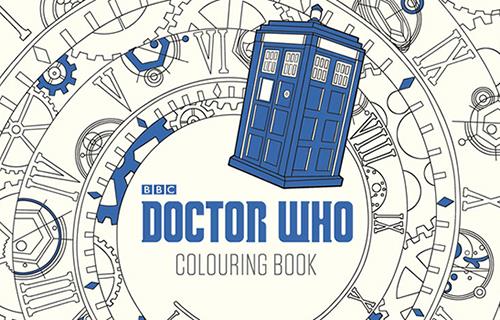
[Editor's note: About once a year, I invite a Rowan University student whose class assignments I find exceptionally well written to contribute a blog post to TVWW, giving us a young adult's perspective on TV. This year's deserving guest columnist is Shannon Farrell -- and her subject is a 53-year-old TV series she calls "a modern Star Trek"... -- David Bianculli]
By Shannon Farrell
For over fifty years, Doctor Who has artfully humanized science fiction. In 1963, the BBC created Doctor Who as a family show, with the intention of teaching young people about science and history. Since then, through stories of time travel and adventure, generations of audiences have experienced a lesson in our own humanity.
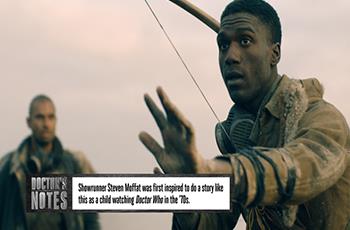 The series, which just completed a special "Doctor's Notes" series of annotated specials on BBC America, follows an eccentric alien, the Doctor, who travels with his human companions through all of time and space, using a blue Police box called the TARDIS. Every few seasons, the Doctor regenerates into a new "body."
The series, which just completed a special "Doctor's Notes" series of annotated specials on BBC America, follows an eccentric alien, the Doctor, who travels with his human companions through all of time and space, using a blue Police box called the TARDIS. Every few seasons, the Doctor regenerates into a new "body."
In reality, this means the show is refreshed with a new actor, a new personality, and, usually soon to follow, a new companion. This pattern has contributed to the lasting success of this series by giving the Doctor room to grow and change. Doctor Who has adapted to suit the tastes of television audiences of every era. While his different regenerations have their own unique personalities, the Doctor generally is a dramatic, clever show-off, with a talent for finding and getting out of trouble.
The Doctor’s various human companions make this alien man accessible to us, the audience, as we have been thrown together into this strange new world. He shows them the wonders of the universe, and in return, his friends keep him grounded and guide him through moral dilemmas. The few times the Doctor is without a companion are the times he is the most alienated, reckless, and dangerous. His intentions are to act with compassion, to be the hero of every story, and to do the right thing. However, the Doctor himself often wonders if he is truly a good man, and the show sometimes explores the question of whether he actually brings more harm than aid.
At the 2013 Celebration of Doctor Who, current showrunner Steven Moffat commented on the value of the Doctor as a hero: "History books," he said, "tell us who we used to be, documentaries tell us who we are now, but heroes tell us who we want to be. And a lot of our heroes depress me."
Then he added, about the protagonist of Doctor Who, "But when they made this particular hero, they didn't give him a gun — they gave him a screwdriver to fix things. They didn't give him a tank, or a warship, or an x-wing fighter — they gave him a call box from which you can call for help. And they didn't give him a superpower, or pointy ears, or a heat-ray — they gave him an extra heart. They gave him two hearts! And that's an extraordinary thing. There will never come a time when we don't need a hero like the Doctor."
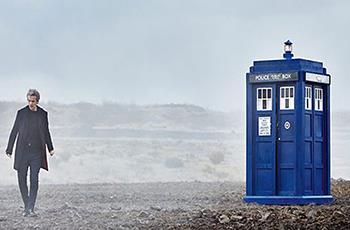 This eccentric Time Lord in a blue box is unique. He is not a superhero; he is not "more than human." Instead, he personifies, intensifies, and idealizes the characteristics of ordinary humanity. The Doctor needs us humans, and we are his heroes, which is why he has found a place in the hearts of so many viewers.
This eccentric Time Lord in a blue box is unique. He is not a superhero; he is not "more than human." Instead, he personifies, intensifies, and idealizes the characteristics of ordinary humanity. The Doctor needs us humans, and we are his heroes, which is why he has found a place in the hearts of so many viewers.
Watching Doctor Who can have a cathartic effect, leaving us dabbing at our eyes one moment, then giddy with laughter, or slack-jawed with awe, the next. Viewers empathize with the Doctor’s struggles and victories, and we begin to welcome the same kind of idealistic morality into our own lives. In this way, Doctor Who has become a modern Star Trek: science fiction television that examines our humanity and inspires our culture.
As much as heroes say about the desires, values, and aspirations of a people, villains also strongly indicate the current fears, weaknesses, and state of morality. In the early years of Doctor Who, the bad guys were clearly evil, and the good guys just as clearly were the Doctor and his companions. As time progressed, those black and white distinctions faded, and the series transitioned into its current state, exploring the moral grey areas between right and wrong.
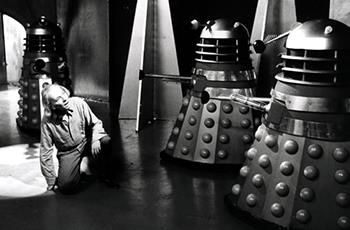
The oldest enemies of the Doctor are the Daleks (pictured): creatures poisoned by fear and hatred, living out their lives in shells of weaponized armor. The Daleks first were introduced in 1963, and have made many reappearances, including in the most recent season. The Daleks represent the evil of humanity: the hatred that grows out of fear and xenophobia. They believe anything "different" must be exterminated — a moral comment that still translates to our cultural interactions today. Since 2005, however, the Daleks have been presented less often as evil, and more frequently as a species at the center of a moral crisis.
The second most frequent recurring villains are the Cybermen: former humans who are now more machine than man. Replacing their bodies with implants until only their brains remain, the Cybermen are the epitome of dehumanized technological advancement (and may make you think twice about buying the newest iPhone). They represent the fear of losing ourselves to cold, robotic, logical science, and the danger of mindlessly replacing humanity with machinery. The Cybermen feel no emotion — it has been programmed out of them — and they insist the only way to survive is to "Upgrade." The Cybermen, too, have recently been presented to the audience as more sympathetic characters.
Doctor Who has risen above its original concept as merely a fun, lighthearted show about time travel. While it remains those things, it also is an exploration of our dreams and our nightmares. The Doctor empowers our sense of humanity by reminding us of how small we truly are in comparison to this vast universe, but he encourages us to remember that we are never too small to change the world. As the Eleventh Doctor says, "Nobody important? Blimey, that’s amazing. You know that in nine hundred years of time and space, I’ve never met anybody who wasn’t important before."
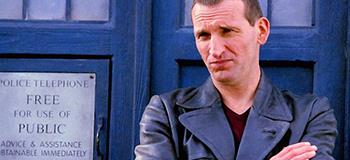 I started watching Doctor Who only two years ago, in 2014. While catching up on fifty years' worth of television seemed intimidating at first, I quickly realized that there was no prerequisite knowledge or background necessary. Even as an adult, I found the expansive universe of Doctor Who welcoming and fascinating. The first Doctor I watched was the Ninth Doctor, played by Christopher Eccleston (pictured). The Ninth Doctor has remained my personal favorite, for his sarcastic charm and brilliant emotional complexity.
I started watching Doctor Who only two years ago, in 2014. While catching up on fifty years' worth of television seemed intimidating at first, I quickly realized that there was no prerequisite knowledge or background necessary. Even as an adult, I found the expansive universe of Doctor Who welcoming and fascinating. The first Doctor I watched was the Ninth Doctor, played by Christopher Eccleston (pictured). The Ninth Doctor has remained my personal favorite, for his sarcastic charm and brilliant emotional complexity.
BBC America just concluded its between-season premieres of Doctor Who: Doctor’s Notes Saturday nights at 9 ET. This special series presented encore telecasts of episodes from Season 9, with added visual commentary. When I watched the Doctor’s Notes version of “Face The Raven,” I found that the fan additions created a collective experience, especially in this particularly emotional episode.
At the beginning of "Face the Raven," fellow twitter fan @moonsyrin remarked, "You know it’s never a good sign when the phone rings in the TARDIS!" As that message appeared on the screen, it echoed my own apprehensions. Featuring fan art, informational recaps from previous episodes, trivia about the cast and the crew, pictures of filming, and details about set locations, the notes definitely enhanced the episode. Some pop-ups even included explanation that added depth to the plot, such as information on the raven's historic association with death.
Overall, Doctor’s Notes shares additional information that can’t be directly included in the episode. The idea is similar to an audio commentary, except that it lets you watch and hear the episode normally. This special series creates a unique interaction between fans and the series, and that relationship is being expanded by the recent release of Doctor Who: The Coloring Book.
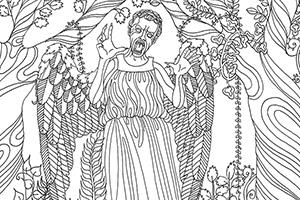 The Price Stern Sloan book from Penguin Random House (priced at $14.00) features 45 intricate and beautiful illustrations that depict everything from the Cybermen, the Daleks, the TARDIS, the Doctor’s companions, memorable scenes and planets, and those frightening weeping angel statues (pictured), to, of course, the thirteen incarnations of the Doctor himself. Alongside fifty years’ worth of Doctor Who quotes, this all-age coloring book is ready to be decorated however you choose.
The Price Stern Sloan book from Penguin Random House (priced at $14.00) features 45 intricate and beautiful illustrations that depict everything from the Cybermen, the Daleks, the TARDIS, the Doctor’s companions, memorable scenes and planets, and those frightening weeping angel statues (pictured), to, of course, the thirteen incarnations of the Doctor himself. Alongside fifty years’ worth of Doctor Who quotes, this all-age coloring book is ready to be decorated however you choose.
Both Classic Doctor Who (1963-1989) and New Doctor Who (2005-present) were available on Netflix and Hulu until February 1, 2016. The BBC recently has pulled Doctor Who from all streaming services. The reason is still unclear, though there are rumors that the BBC may be planning to launch its own streaming service in the near future. In the meantime, Doctor Who can be purchased by episode, or by season, on Amazon Video or on DVD.
--
[Shannon Farrell currently is a junior at Rowan University, studying both Radio/Television/Film and Writing Arts. Her other favorite television shows include Community, Psych, and the BBC Sherlock series.]